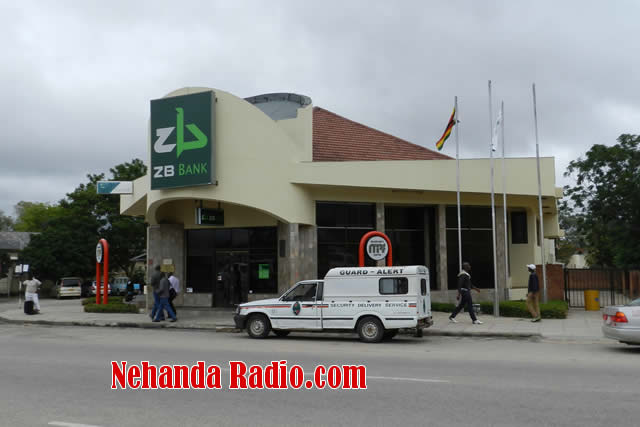- Just a month before Christmas Zimbabweans are standing in long winding queues to withdraw cash from banks, amid reports of a fresh liquidity crunch.
Simon Muchemwa, our correspondent in Harare, told us that cash shortages and long bank queues, last seen during the 2008 meltdown when the Zim dollar was still in use, are now commonplace.
Queue for cash at MetBank Bulawayo (Picture by Nehanda Citizen Reporter)
After the July elections were controversially ‘won’ by ZANU PF, the country’s banking sector lost nearly a $1 billion to offshore accounts due to political uncertainty amid concerns about the new government’s economic policies.
Muchemwa said depositors are no longer making regular deposits and this has resulted in most banks imposing withdrawal limits of $200, in an attempt to make the little cash available go around.
Civil servants were last week paid their annual November bonuses and have been rushing to banks to access their salaries, a situation that has increased the demand for cash ahead of the festive season.
Munjonzi Mutandiri, the regional coordinator of the newly formed political party the NCA, told SW Radio Africa that there is no debate the economy’s performance is linked to the politics of the country.
A security truck at ZB Bank Bulawayo prepares to take bank notes to Plumtree (Picture by Nehanda Citizen Reporter)
‘In Zimbabwe it is clear that the government is arrogant and to a certain extent irresponsible for bringing economic ideas that are not in the best interests of the country.
‘Their economic policies are not good for the country and that brings lack of confidence in the economy. The only way to remedy this is to go back to the drawing board and come up with a blue print that helps the nation and not individuals,’ Mutandiri said.
Economist Luke Zunga agreed that the flight of money from Zimbabwe was because of the economic policies generated by the political system.
‘One of such policies is indigenization, so anybody who is sitting in Zimbabwe with a business there would think twice whether to keep their money or not. The political system doesn’t encourage growth in the economy itself and it is a derivative of the economic policies of the government,’ Zunga said. SW Radio Africa
ZIMBABWE: The owners of foreign firms operating in certain sectors in Zimbabwe after 1 January 2014 will be arrested, a senior official has warned.
Economic Empowerment Secretary George Magosvongwe issued the warning in parliament, state media reports.
"Indigenisation" of the economy was one of President Robert Mugabe's main campaign themes in the March election.
Farming, hairdressing and baking are among the sectors now reserved for "indigenous", or black, Zimbabweans.
"1 January is a month to come and we are putting in place measures for enforcement in the event that they do not comply," the state-owned Herald newspaper quotes Mr Magosvongwe as saying.
He said that Zimbabweans were being identified to take over businesses to prevent shortages of goods.
According to the Herald the "reserved sectors of the economy" include: Retail and wholesale business, hairdressers, beauty salons, bakers, employment agencies, agriculture, transport, estate agencies and advertising agencies.
It said that foreign-owned restaurants which did not serve local food would not be affected.
Owners of businesses without indigenisation compliance certificates face a fine or imprisonment if they are still operating, the Herald reports.
It says these certificates are only given to local people.
The BBC's Brian Hungwe in Harare says that there has been growing concern in Zimbabwe over an influx of traders from Nigeria and China who sell all sorts of goods in local markets, undercutting local retailers.
Mr Mugabe says his policies are needed because under colonial rule, many economic sectors were reserved for white people.






